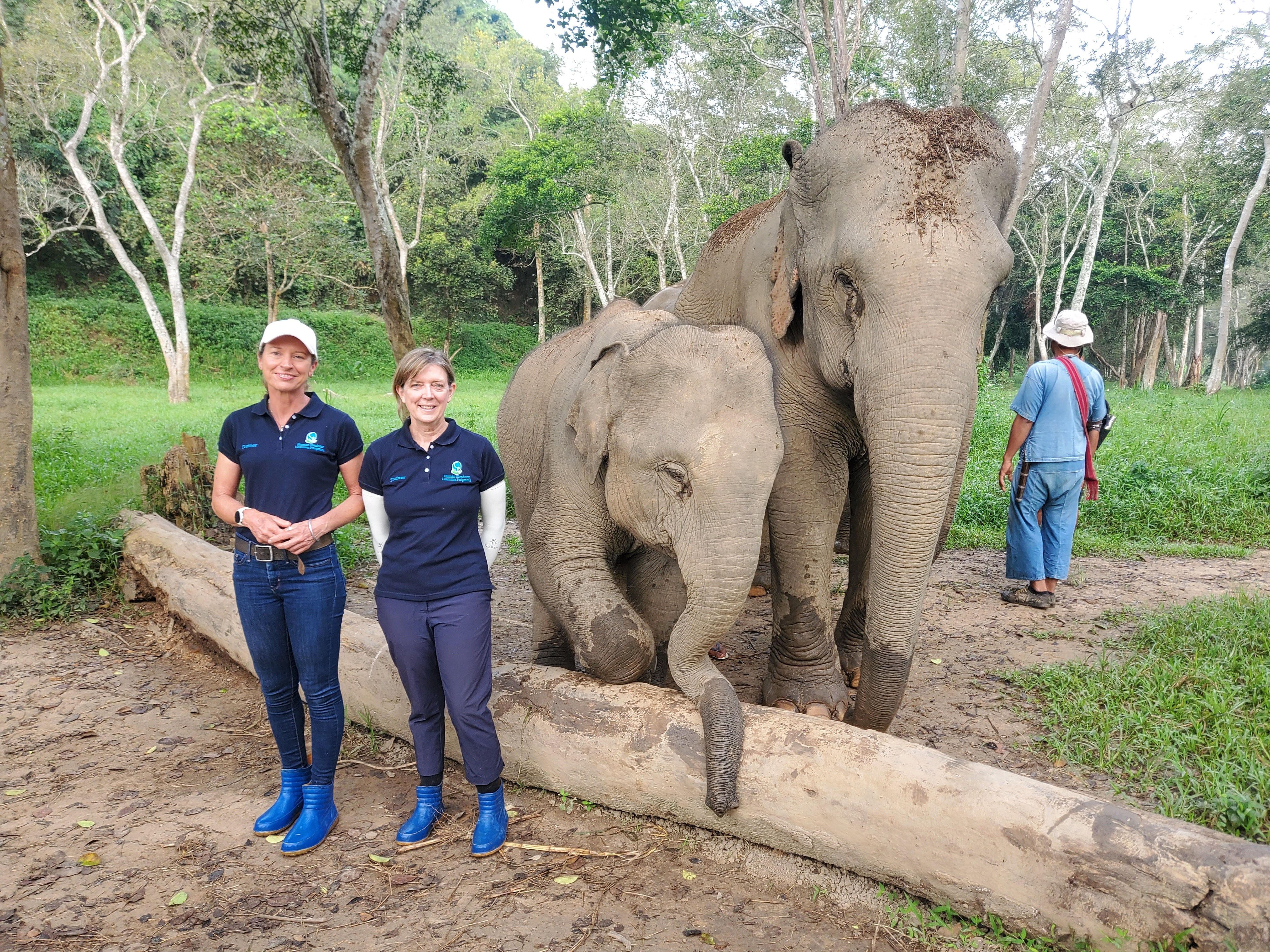In November 2023, two H-ELP trainers visited the Anantara Golden Triangle Elephant Camp and Resort in the far north of Thailand, bordering Myanmar and Laos.
Senior trainer, Dr Andrew McLean, was unable to attend due to a medical condition so Dr Portland Jones and Nicki Stuart teamed up for this trip. Portland took care of all the travel logistics and had also invited Vijo Virghase, founder of OurLand, to join the team as translator and fixer. Vijo’s fluent Thai and insights into local culture as well his enthusiasm for H-ELP’s work was in Portland’s words ‘a game changer’ in terms of enhancing communication and our effectiveness in the field.
Also with us was one of H-ELP’s long-term supporter, zoologist Nina Orthmann-Brask, who has liaised with us on behalf of The Danish Animal Welfare Society.
Training Report
Friday 10th November
AM – Classroom session. Head veterinarian, Dr Nissa Mututanot, took the opportunity to begin by workshopping the H-ELP Training App. Nicki led this discussion, and we gained valuable feedback on key dimensions of the app. This followed with Portland presenting on How Animals Learn.
PM – The team visited mahouts at work in the field. There were three elephants available, Beau, a female aged 44, another female Yoktah aged 10 and Chopatch, a 4-year-old male. We asked the mahouts to show us the commands and responses they used routinely. We observed that there were a variety of commands and pressures for the same responses and an escalation of voice commands when the elephants did not comply. The mahouts are instructed to carry their ankus in a cloth sleeve, slung over their shoulder, and they did not use them this day. We asked them to deliver tactile pressures with a bamboo cane or their hand. In order to establish whether responses could be elicited without voice cues we asked Yoktah’s mahout, Mr Sa-Nga, to have his elephant to step back from hand pressure alone. The elephant appeared untrained to his hand pressure on the trunk and shoulder. The next day, Mr Sa-Nga reported that this enlightened him as to just how important the voice commands are to elephants. Regrettably, the message of instilling negatively reinforced signals for locomotory responses before classically conditioning voice cues may have been ‘lost in translation’. This has been emphasised in the training app.
The young bull, Chopatch, under the care of mahout, Jumbo, responded well considering his higher energy levels but at times showed what appeared to be some conflict behaviour. Our focus with all three elephants and mahouts was to share the importance of clear training and shaping of step-back and stay through combined reinforcement. In particular, and awareness of the need to mark desired behaviours and positively reinforce immediately. The food reward used in this camp is sunflower seeds, which the elephants all seem to enjoy.
Saturday 11th November
AM – We rose early to join one of the camp activities ‘Walking with Giants’, where guests follow mahouts and elephants on their morning walk. This was great opportunity to further observe the interactions between elephants and mahouts.
Later, in the classroom, Portland presented on classical conditioning. This sparked many interesting and valuable questions. It is our observation that even some of the most educated elephant handlers still hold the belief that elephants ‘understand’ what they are being asked to do and perhaps attribute the animal with higher cognitive abilities than they hold.
PM – Another visit with the same elephants from yesterday showed some improvements in the clarity of responses and we went over again the importance of instilling responses through negative reinforcement initially. Chopatch’s mahout shared that he achieved better results when using the detached head of his ankus on the elephant and we asked him to demonstrate. He was able to deliver light touches that the elephant responded to immediately.
We also had the opportunity to meet up again with a mahout who had attended previous workshops. He reported that the methods he had learned worked well and he demonstrated the training of his elephant, which was of a high standard.
Sunday 12th November
AM – In this classroom session Portland led a session on shaping and used the Portal game to aid understanding. This is a fantastic learning tool and was well received.
PM – This was our first opportunity to seek some mahout input on the training app. Dr Nissa accompanied us to the camp and we were able to sit down with three senior mahouts to run them through the app. The reactions were positive, overall, and they said it would be useful to train new mahouts.
Conference Report
Tuesday 14th – Thursday 16th November
Nicki, Portland and Vijo attended the 19th Annual Elephant Conservation and Research Symposium. This was an excellent opportunity to gain insight into the efforts being made throughout Asia and Africa to safeguard habitat, manage human-elephant conflict, improve the health and management of captive elephants, better understand behaviour and the myriad of efforts being made to protect the future of elephants.
We were able to identify key players with whom it would be useful to explore allegiances in the future, as well as showcasing the app in conversations around conference proceedings. We were disappointed that our paper was not accepted as we felt it would have been particularly relevant under the welfare banner. It became apparent, through talking to other like-minded people, that there may be a bias against working in free contact with captive elephants. This was not surprising but means that we have more work to do in communicating our philosophy and rationale.
If you would like to contribute to H-ELP's overall mission, please leave a donation.
